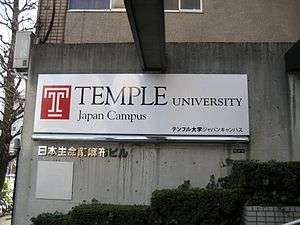Temple University, Japan Campus
|
TUJ's Azabu Hall | |
| Established | 1982 |
|---|---|
| Dean | Bruce Stronach[1] |
| Degree Programs[2] | |
| Undergraduate Programs | 940 |
| Executive MBA Program | 38 |
| Graduate College of Education | 228 |
| Non-degree Programs[3] | |
| Academic English Program | 94 |
| Continuing Education | 788 |
| Total Enrollment | 2,154 |
| Corporate Education | 788 |
| English Training Programs | 858 |
| Faculty | 134 |
| Staff | 184 |
| Locations | Minato-ku, Tokyo / Kita-ku, Osaka |
| Abbreviation | TUJ |
| Website | |
| English |
www |
| Japanese |
www |
Temple University, Japan Campus (Abbreviated: TUJ, Japanese: テンプル大学ジャパンキャンパス) is an international campus of Temple University (located in Philadelphia, PA, United States). TUJ has classrooms and student facilities in two buildings located in Minato-ku, Tokyo, Japan.[4] It is the oldest and largest foreign university in Japan, with an estimated 1,300 matriculated students, of which approximately 60% come from 60 countries around the world (approximately 40% are from Japan).[5]
The university offers many degree programs, including; an A.A., B.A., M.S.Ed., Ed.D., Ph.D., MBA, LL.M. and semester and year-long study abroad programs for U.S. undergraduate and law students. In addition, TUJ offers non-degree programs including English-language (ESL), continuing education for adults, and corporate education.[6] As of July 2016, TUJ enrolls 1,272 degree-seeking students: 940 undergraduates and 332 postgraduates (38 EMBA, 66 Law, and 228 Graduate College of Education). Non-degree enrollment totals 882, including 94 Academic English Program students and 788 Continuing Education students. Additionally, TUJ’s Corporate Education program trains 1,638 corporate employees annually and offers English training programs for educational organizations with an annual participation rate of roughly 858.[7]
History
Establishment
Temple University, Japan Campus (TUJ) was established in 1982 in Shiba-Koen, Minato-ku, becoming the first campus of an American university in Japan. The university initially operated under partnership with several local businesses until 1996, when those relationships were terminated and TUJ became a wholly owned operation of Temple University. During this time, the campus was relocated to Minami-Azabu, Minato-ku, where it continues to operate today.[8]
Early years

At its inception, the university offered an Intensive English Language Program (IELP) in its Tokyo campus, as well as a Master of Education (M.Ed.) program in both its Tokyo and Osaka centers. Within the next decade it launched an Undergraduate Program, a Doctor of Education (Ed.D.) in TESOL program and a Master of Laws (LL.M.) program, as well as expanded its IELP program to its Osaka center. In 1996, upon becoming a wholly owned operation of Temple University, TUJ launched the Executive MBA program - the first program of its kind in Japan - while simultaneously re-launching its Open College Program and Globalization Program as the Continuing Education and Corporate Education programs, respectively.[9]
Gaining its current status
In 2005 the Japanese Ministry of Education, Culture, Sports, Science and Technology (MEXT) officially designated Temple University, Japan Campus as the first Foreign University in Japan becoming the first recognized foreign university operating in Japan (外国大学日本校, gaikoku daigaku nihonkō).[10] This gave TUJ recognition amongst not only American Universities, but also Japanese Universities, making credits and degrees from the university accredited in both countries.[11]
Partnerships and agreements
TUJ has established Credit Exchange Programs with Musashi University, Toyo University Faculty of Regional Development Studies, and the School of Arts and Letters at Meiji University. In addition, the university has signed Memorandums of Understanding with both Toyo and National Taipei Universities, and has established the Musashi Temple RED Program for junior high and high school students who plan to study abroad or at a foreign university in Japan.[12]
Campus
Locations
Temple University, Japan Campus consists of three locations in both Tokyo and Osaka. Within Tokyo, TUJ operates out of two halls both located in Minato-ku, Tokyo. Azabu Hall, in Minami-Azabu, houses the Undergraduate, Graduate College of Education, Academic English Program and Continuing Education programs. Mita hall, located in Mita, houses the Executive MBA, Law and Corporate Education programs.[13] The Osaka center is located in Umeda, Kita-ku and houses the Graduate College of Education program.[14] Additionally, the university has an Annex building located nearby, used primarily for administrative purposes.
Facilities
TUJ has six computer labs equipped with Windows, Mac and Unix computers; a library with over 50,000 books and access to an extensive collection of journal subscriptions;[15] a career development office; counseling; a post-production studio with both video-editing and professional sound recording capabilities; and a teaching and learning center providing free tutoring to students.[16]
Student housing
TUJ offers guaranteed housing for all first semester international students. The school operates two unisex dormitories located in Tokyo and offers a limited number of homestay options.[17]
Academics
Degree programs
| Program | Degrees Offered |
|---|---|
| Undergraduate Program | B.A. / B.S. / A.A.
Majors |
| Master's and Doctoral Programs in Education | M.S.Ed. in TESOL
Ph.D. in Applied Linguistics |
| Executive MBA Program | MBA |
| Law School | LL.M.
Other |
English Program
| Overview | |
|---|---|
| Academic English Program | English-language program for preparing to enter English-medium college or graduate school. |
Continuing Education
| Areas of Study | |
|---|---|
| Continuing Education | Languages Academic Skills Culture and the Arts Professional Training Business and Management Computers and Technology |
Corporate Education
| Overview | |
|---|---|
| Corporate Education | Development, implementation, and delivery of customized employee training programs for international corporations. |
Institute of Contemporary Asian Studies (ICAS)
Established in 2004, ICAS (formerly the Institute of Contemporary Japanese Studies) is an institute run by TUJ providing a platform for scholars worldwide to present their studies and facilitate academic discussions.[18] It hosts about 30 lectures and symposiums each year, all open to the public and usually free of charge. Lecture topics – focusing on contemporary Asia as well as American-related affairs – range from politics, the economy, foreign and military affairs, cinema and pop culture, to healthcare systems and environmental issues. Participants include a wide range of individuals from the foreign and Japanese media, business, government and academic communities.[19]
Student life
Students
Students attending TUJ come from approximately 60 countries around the world. In addition to Japan and the United States, TUJ has students from East and Southeast Asia, Russia, the Middle East, Africa, Latin America, and Europe.[20]
Temple University, Japan Campus is able to sponsor visas for its international students[21] and provides Japanese student identification cards, student discounts for train passes,[22] assistance with mobile phone contracts, and other student-life related items. Additionally, TUJ offers a number of options for students to study abroad in one of its sister campuses located around the world.[23]
Office of Student Services
The Office of Student Services provides assistance related to daily student life to TUJ’s student body. Additionally, the OSS also provides assistance with the visa application process, coordinating Financial Aid/GI Bill-related matters and housing. The OSS also provides orientations to help students adapt to the academic and social life at TUJ. They also work with the Student Government and other student organizations to encourage social interaction among students with different backgrounds by creating events and activities that appeal to all TUJ students.[24]
Student Government
The Student Government serves as the voice of the student body, and advocates for their needs as their elected representatives. The Student Government also organizes various events during the academic year to help promote active student life.[25]
Organizations
Student organizations are created and run by students and overseen by the Office of Student Services (OSS). These organizations help students identify others with similar interests, and promote friendship among students.[26]
Community relations
Minato City
Temple University, Japan Campus takes part in several community-oriented activities, primarily in the form of volunteer or educational assistance. In partnership with the local Minato City government, TUJ has provided support to children and adults within the Minato area as part of their Agreement on Joint Activities established in 2006.[27]
Culture and education
TUJ sends foreign students and staff to schools located in the Minato area to introduce their respective cultures. It also offers short-term programs for elementary and junior high school students and their teachers in an effort to improve English Education in Japan. In addition, the university periodically hosts lectures on the topic of contemporary Japan as part of the Minato City adult education program. The TUJ library is open to all Minato teachers and residents.[28]
Events
Students, faculty and staff take part in various Minato City events each year, including; the Minato Citizen’s Festival, the Konan Civic Center English Program and numerous Shrine Festivals in the area.[29]
Social media
Temple University, Japan Campus operates a number of social media accounts including; Blogs run in both English and Japanese, Facebook, Instagram, LinkedIn and Twitter accounts, as well as an official TUJ Youtube channel.[30]
References
- ↑ TUJ Communications. "Dean's Profile". http://www.tuj.ac.jp/. External link in
|website=(help) - ↑ TUJ Communications. "Basic Facts about Temple University, Japan Campus". http://www.tuj.ac.jp/. External link in
|website=(help) - ↑ TUJ Communications. "Basic Facts about Temple University, Japan Campus". http://www.tuj.ac.jp/. External link in
|website=(help) - ↑ TUJ Communications. "Maps and Directions, Tokyo". http://www.tuj.ac.jp/. External link in
|website=(help) - ↑ TUJ Communications. "Basic Facts about Temple University, Japan Campus" (PDF). http://www.tuj.ac.jp/. External link in
|website=(help) - ↑ TUJ Communications. "Temple University Programs Page". http://www.tuj.ac.jp/. External link in
|website=(help) - ↑ TUJ Communications. "Basic Facts about Temple University, Japan Campus". http://www.tuj.ac.jp/. External link in
|website=(help) - ↑ TUJ Communications. "About Temple, History". http://www.tuj.ac.jp/. External link in
|website=(help) - ↑ TUJ Communications. "About Temple, History". http://www.tuj.ac.jp/. External link in
|website=(help) - ↑ TUJ Communications. "MEXT designates TUJ Japan's First Foreign University, Japan Campus". http://www.tuj.ac.jp/. External link in
|website=(help) - ↑ TUJ Communications. "About Temple, History". http://www.tuj.ac.jp/. External link in
|website=(help) - ↑ TUJ Communications. "About Temple, Partner Institutions". http://www.tuj.ac.jp/. External link in
|website=(help) - ↑ TUJ Communications. "Maps and Directions, Tokyo". http://www.tuj.ac.jp/. External link in
|website=(help) - ↑ TUJ Communications. "Maps and Directions, Osaka". http://www.tuj.ac.jp/. External link in
|website=(help) - ↑ TUJ Communications. "Services and Facilities, The Collection". http://www.tuj.ac.jp/. External link in
|website=(help) - ↑ TUJ Communications. "Services and Facilities". http://www.tuj.ac.jp/. External link in
|website=(help) - ↑ TUJ Communications. "Housing Options - Dorms and Homestays". http://www.tuj.ac.jp/. External link in
|website=(help) - ↑ TUJ Communications. "Institute of Contemporary Asian Studies (ICAS)". http://www.tuj.ac.jp/. External link in
|website=(help) - ↑ Temple University, Japan Campus General Information. 2016, pg. 11.
- ↑ TUJ Communications. "Basic Facts about Temple University, Japan Campus". http://www.tuj.ac.jp/. External link in
|website=(help) - ↑ TUJ Communications. "TUJ Eligible to Sponsor Student Visas". http://www.tuj.ac.jp/. External link in
|website=(help) - ↑ TUJ Communications. "Railway Companies in Eastern Japan Grant Student Rail Discounts to TUJ Students". http://www.tuj.ac.jp/. External link in
|website=(help) - ↑ TUJ Communications. "About the Main Campus". http://www.tuj.ac.jp/. External link in
|website=(help) - ↑ TUJ Communications. "Student Services". http://www.tuj.ac.jp/. External link in
|website=(help) - ↑ TUJ Communications. "Student Government". http://www.tuj.ac.jp/. External link in
|website=(help) - ↑ TUJ Communications. "Student Activities, Clubs and Organizations". http://www.tuj.ac.jp/. External link in
|website=(help) - ↑ TUJ Communications. "About Temple, Community Relations". http://www.tuj.ac.jp/. External link in
|website=(help) - ↑ TUJ Communications. "About Temple, Community Relations". http://www.tuj.ac.jp/. External link in
|website=(help) - ↑ TUJ Communications. "About Temple, Community Relations". http://www.tuj.ac.jp/. External link in
|website=(help) - ↑ TUJ Communications. "Official TUJ Social Media Accounts". http://www.tuj.ac.jp/. External link in
|website=(help)
External links
| Wikimedia Commons has media related to Temple University, Japan Campus. |
Coordinates: 35°38′54.65″N 139°44′10.44″E / 35.6485139°N 139.7362333°E

